A New Song Read online
Page 26
He breathed a sigh of relief and wiped his forehead with the tail of his T-shirt. Blast, what a commotion.
His dog’s tail was between his legs as they marched toward the house.
“Thank you!” he shouted to the open upstairs window. “We’ll try not to trouble you again.”
Silence.
As they swung left into the driveway, he gave one of the gnarled roots an impatient kick.
“Goodbye and good riddance,” he muttered under his breath.
Now the duck possessed a portion of its other wing.
He handled it carefully, admiring the lifelike beauty of the emerging creature.
“Do you . . . sell these?” he asked Roger.
“Oh, yes. I haven’t kept one for myself in a good while.”
“What kind of money do they go for?” Four, maybe five hundred, he thought, and well worth it!
Roger’s brown eyes sparkled, as they often did when he spoke of his craft. “I’ll probably ask around fifteen hundred for this one.”
With what he hoped wasn’t obvious haste, he handed it back to Roger.
Ernie thumped into a chair at their table. “Junior’s been turned down flat,” he said, looking crestfallen.
“How? Who?”
“Ava. She won’t go out with ’im, won’t even let ’im meet ’er daddy.”
“I hate to hear it.”
“If you ask me,” said Ernie, “it was those pictures that did ’im in. Junior’s better lookin’ than those pictures.”
Roanoke took a cigarette from behind his ear. “His fish done wiggled off th’ hook.”
Ernie sighed. “We could take ’em again with a better camera. I could get one from th’ Whitecap Reader, I think they use Nikes.”
“Nikons,” said Roger, not looking up from his work.
“He ought to start over an’ run another ad,” said Roanoke. “Leave out th’ Bronco business, leave out th’ Scrabble business, keep in th’ fishin’ part, axe th’ stuff about a serious relationship—”
“He don’t want to run another ad,” said Ernie. “He don’t want to start over, he wants to meet Ava.”
“What did he say in his letter to her? Maybe that’s the key.”
“Beats me. I tried to tell him what to say, but who knows?” Ernie shrugged, looking disconsolate.
For a while, the only sound was Roger’s knife against the tupelo wood.
He threw his cup in the wastebasket by the Pepsi machine and fished around in his shorts pocket for fifty-cents, which he gave Ernie for the Reader.
Roanoke had pedaled away on his bicycle, Roger was walking Lucas, and Father Tim figured this was as good a chance as he’d get.
“Ernie,” he said, “tell me everything you know about Morris Love.”
CHAPTER THIRTEEN
Mighty Waters
He was awake ten minutes before the alarm went off, and heard at once the light patter of rain through the open window.
“Timothy?”
“Yes?”
“Is it four o’clock?”
“Ten ’til. Go back to sleep.”
“You’ll have a great time, I just know you will.”
“I’m sure of it. And remember—don’t cook dinner. I’m bringing it home.”
“Right, darling. I’m excited. . . .”
She was no such thing; she was already snoring again. He kissed her shoulder and crept out of bed.
He was accustomed to rising early, but four o’clock was ridiculous, not to mention he couldn’t get pumped up for this jaunt no matter how hard he tried.
He’d entertained every fishing yarn anyone cared to tell, trying to mask his blank stare with a look of genuine interest. Ah, well, surely the whole business would pleasantly surprise him—he’d return home with a cooler full of tuna, tanned and vigorous from a day on the water, whistling a sea chantey.
Chances were—and this was not a perk to be taken lightly—it could even blow a fresh breeze through his preaching, not to mention make him feel more one-in-spirit with his parish. After all, he’d been on their turf for three months and practically the only thing he’d done that he couldn’t have done in Mitford was slap a few mosquitoes and pick sandspurs from his dog’s paws.
He dressed hurriedly in the bathroom, brushed his teeth, splashed water on his face, and raced to the kitchen to gulp down a cup of coffee he’d set in the refrigerator last night, figuring cold caffeine to be better than no caffeine at all.
He packed the canvas bag with his lunch, having entirely dismissed the notion of fried chicken. Where on earth anybody would find fried chicken at four in the morning was beyond him. He stuffed in plenty of bottled water and a couple of citrus drinks. No time to eat, he’d do that on the boat, he was out of here.
His dog followed him along the hall, thumped down by the front door, and yawned mightily. “Guard the house, old fellow.”
Dark as pitch. He turned the lock, shut the door behind him, and patted his jacket pockets for the rolled-up canvas hat and bottle of sunscreen. All there.
He stood on the porch and drew in a deep draught of the cool morning air; it was scented with rain and salt, with something mysteriously beyond his ken. He didn’t think he’d ever again take the ocean for granted. He daily sensed the power and presence of it in this new world in which they were living.
All those years ago when he was a young clergyman in a little coastal parish, the water had meant nothing to him; it had hardly entered his mind. He might have lived in the Midwest for all the interest he took in the things of the sea, except for the several bushels of shrimp and clams he’d surely consumed during his curacy. His mind, his heart had been elsewhere, in the clouds, perhaps; but now it was different. Though he wasn’t one for swimming in the ocean or broiling on the beach, he was making a connection this time, something he couldn’t quite articulate and why bother, anyway?
The light rain cooled his head as he trotted down the front steps, opened the gate, and got into the Mustang parked by the street.
Goin’ fishin’! he thought as he buckled the seat belt. The way he’d worried about this excursion had made it seem like a trek to Outer Mongolia, but so far, so good. And just think—there were thousands, probably millions of people out there who’d give anything to be in his shoes.
It was still dark when he found the marina where the charter boats were tied to the dock like horses waiting to be saddled.
He pulled into the nearly full parking lot, took his gear from the trunk and locked up, then stood by the Mustang, peering into the murky light. People were huffing coolers as big as coffins out of vans and cars, muttering, calling to each other, laughing, slamming doors.
More than once, he’d heard charter boats called party boats, and fervently hoped this was not one of those deals.
Raining a little harder now, but nothing serious. He wiped his head with his hat and put it back in his pocket, checking his watch. Five o’clock sharp.
He hefted the cooler and started walking, looking for Blue Heaven and trying to get over the feeling he was still asleep and this was a dream.
Someone materialized out of the gray mist, smelling intensely of tobacco and shaving lotion.
“Mornin’, Father! Let’s go fishin’!”
“Otis? Is that you?”
“Cap’n Willie told me you were on board today. I didn’t want you goin’ off by yourself and havin’ too much fun.”
Otis was schlepping a cooler with a fluorescent label that was readable even in the predawn light: Bragg’s for All Your Cement Needs.
A bronzed, bearded Captain Willie stood on the deck wearing shorts and a T-shirt, booming out a welcome.
“Father Timothy! Good mornin’ to you, we’re glad to have you!” He found himself shaking a hand as big as a ham and hard as a rock. “Step over lightly, now, let me take that, there you go, welcome to Blue Heaven.”
“Good morning, Captain. How’s the weather looking?” It seemed the boat was lurching around in the water pretty good, and
they hadn’t even gone anywhere yet.
“Goin’ to fair off and be good fishin’.” Captain Willie’s genial smile displayed a couple of gold teeth. “Meet my first mate, Pete Brady.”
He shook hands with a muscular fellow of about thirty. “Good to see you, Pete.”
“Yessir, welcome aboard.”
“This your first time?” asked the captain.
“First ever.”
“Well, you’re fishin’ with a pro, here.” He pounded Otis on the back. “Go on in th’ cabin, set your stuff down, make yourself at home. And Father . . .”
“Yes?”
“Would you favor us with blessin’ th’ fleet this mornin’?”
“Ah . . . how does that work, exactly?”
“All th’ boats’ll head out about th’ same time, then after the sun rises, you’ll come up to th’ bridge an’ ask th’ Lord for safe passage and good fishin’. Th’ other boats can hear you over th’ radio.”
“Consider it done!” he said, feeling a surge of excitement.
“We’ll have prayer requests for you, like, the last few days, we’ve all been prayin’ for Cap’n Tucker’s daughter, she’s got leukemia.”
“I’m sorry. I’d feel honored and blessed to do it.”
“We thank you. Now go in there and introduce yourselves around, get comfortable.”
Father Tim stuck his head in the cabin.
Ernie Fulcher, sitting with a green cooler between his feet, threw up his hand and grinned from ear to ear. “Didn’t want you runnin’ out th’ first time all by your lonesome.”
“Right,” said Roger, looking shy about butting in. “We didn’t think you’d mind a little company.”
Madge Parrott and her friend Sybil Huffman appeared to be dressed for a cruise in the Bahamas. They were clearly proud to announce they were from Rome, Georgia, and this was their first time on a fishing charter. They were out for marlin, would settle for tuna if necessary, but no dolphin, thank you, they’d heard dolphins could sing and had feelings like people.
Both were widows whose husbands had been great fishermen. this trip was about making a connection with the departed, as they’d heard Chuck and Roy talk about deep-sea fishing like it was the best thing since sliced bread. Madge confessed that even though she and Sybil didn’t drink beer, they didn’t see why they couldn’t catch fish like anybody else.
He noted that the group shared a need to explain what they had in their coolers, some even lifting the lids and displaying the contents, and issuing hearty invitations to dip in, at any time, to whatever they’d brought along.
“You run out of drinks, me’n Roger got all you want right here,” said Ernie, patting a cooler as big as a Buick. “Got Sun-drop, Mello Yello, Sprite, just help yourself.”
“And there’s ham and turkey on rye,” said Roger. “I made two extra, just in case, plus fried chicken.”
Everybody nodded their thanks, as the engines began to throb and hum. Father Tim was mum about the contents of his own cooler—two banana sandwiches on white bread with low-fat mayo.
“Y’all need any sunscreen,” said Madge, “we’re loaded with sunscreen. It’s right here in my jacket pocket.” She indicated a blue jacket folded on the seat, so that one and all might note its whereabouts in an emergency.
“And I’ve got Bonine,” said Sybil, “if anybody feels seasick.” She held up her package and rattled the contents.
“Have you ever been seasick?” Madge asked Father Tim.
“Never!” he said. Truth was, he’d never been on the sea but a couple of times, and always in sight of shore, so there was no way he could have been seasick. And for today, he’d done what Ernie and Roger so heartily recommended—he’d stayed sober, gotten a good night’s sleep, and didn’t eat a greasy breakfast.
“Only twelve percent of people get seasick,” Roger said, quoting his most encouraging piece of information on the subject.
Ernie lifted the lid of his cooler. “Oh, an’ anybody wants Snickers bars, they’re right here on top of th’ ice. There’s nothin’ like a Snickers iced down good’n cold.”
Madge and Sybil admitted they’d never heard of icing down a Snickers bar, but thought it would be real tasty, especially on a hot day. Sybil pledged to try one before the trip was over.
Otis announced that anybody who wanted to help themselves to his Kentucky Fried, they knew where it was at. He also had cigars, Johnnie Walker Black, and boiled peanuts, for whoever took a notion.
It was the most instant formation of community Father Tim had ever witnessed. He felt momentarily inspired to stand and lead a hymn.
Captain Willie gunned the engines, and the stern of Blue Heaven dug low into the water as they moved away from the dock at what seemed like full speed. Father Tim realized he didn’t know how he felt about riding backward, not to mention that the water seemed mighty rough.
Very dadgum blasted rough, he thought as they plowed farther out in an unceasing rain. He looked around the hull of the small cabin, where everyone appeared totally sophisticated about being tossed around like dice in a cup. They were all holding on for dear life to whatever they could grab, and yelling over the roar of eight hundred and fifty horses running wide open.
Otis Bragg was clearly tickled pink to have two women on board who didn’t know fishing from frog’s legs. He’d already begun a seminar on how to keep your thumb on the fishing line, how to hold the rod, how to hold your mouth, and how to position your feet when reeling in a big one. Father Tim listened as attentively as he could, then finally slumped against the back of the padded bench and peered through the door of the cabin.
Out there, it was rain, churning waters, and diesel smoke. In here, it was earsplitting racket and the worst ride he’d had since Tommy Noles had shoved him down a rocky hillside in a red wagon without a tongue.
The sun was emerging from the water, staining the silver sea with patches of light and color.
Pete Brady came into the cabin, holding a dripping ballyhoo in one hand. “You’ll want to go up to the bridge now, sir. Better put your jacket on.”
“Right!” he said. He was glad to leave the cabin; only a moment ago, he’d had the odd sensation of smothering. . . .
He stood, holding on to the table that was bolted to the deck, then made his way to the door, praying he wouldn’t pitch into Madge Parrott’s lap.
“You tell th’ Lord we’re wantin’ ’em to weigh fifty pounds and up, if He don’t mind.” Otis chewed his cigar and grinned.
Father Tim clung to the doorjamb. “How do I get to the bridge?” he asked Pete.
The first mate, who appeared to be squeezing the guts from a bait fish, jerked his thumb toward the side of the cabin. “Right up the ladder there.”
He peered around and saw the ladder. The rungs were immediately over the water, and went straight up. Three, four, five . . .
“That ladder?”
“Yessir, be sure’n hold on tight.”
He peered into the black and churning sea, and made a couple of quick steps to a chair that was bolted to the cockpit deck. Pete was bustling around without any difficulty in keeping his footing, but Father Tim had the certain feeling that if he let go of the chair, he’d end up at the Currituck Light.
He turned and lunged for the bottom rung of the ladder, but miscalculated and bounced onto the rail. Too startled to grab hold, he reeled against the cabin wall, finally managing to grip the lower rung. Thanks be to God, Pete was baiting a hook and facing seaward, and his cabin mates were oblivious to his afflictions.
Lord Jesus, I’ve never done this before. You were plenty good around water, and I’m counting on You to help me accomplish this thing.
He reached to an upper rung and got a firm grip.
The spray was flying, the waves were churning, the sun was rising . . . it was now or never. He swung himself onto the ladder and went up, trying in vain to curl his tennis shoes around the rungs like buns around frankfurters.
He hauled himse
lf to the bridge, grabbed the support rail for the hard top, and stood for a moment, awed. The view from the bridge literally took his breath away.
How could anyone doubt the living truth of what the psalmist said? “The heavens declare the glory of God, the skies proclaim the work of his hands!” He wanted to shout in unabashed praise.
His shirt whipped against his body like a flag; his knees trembled. This boat was flying, no two ways about it, and beneath their feet, the endless, racking, turbulent sea, and a sunrise advancing up the sky like tongues of fire.
Surely this was the habitation of angels, and life in the cabin a thing to be pitied.
He lurched to the helm, where Captain Willie was holding a microphone, and grabbed the back of the helm chair.
“We’re glad to have you with us, Father! Greetings to you from th’ whole fleet on this beautiful September day!”
His stomach did an odd turn as he opened his mouth to speak, so he closed it again.
The captain winked. “Got a little chop this mornin’.”
He nodded.
“A real sharp head sea.”
He felt sweat on his brow as the captain spoke into the microphone.
“We’re mighty happy to have Father Tim Kavanagh to lead us in prayer this mornin’. He’s from over at Whitecap, where Toby Rider has his boat shop. Anybody with a prayer request, let’s hear it now.”
The VHF blared. “Father, my little boy fell off a ladder on Sunday, he’s, ah, in the hospital, looks like he’s goin’ to be fine, but . . . his name’s Danny. We thank you.”
“Please pray for Romaine, he had his leg tore up by a tractor fell on ’im. Thank you.”
“Just like to ask for . . . forgiveness for somethin’ I done, there’s no use to go into what, I’d appreciate it.”
Several other requests came in as he bent his head and listened intently, gripping the helm chair for all he was worth.
“That it? Anybody else?”
He fished in his pocket for his hat. Though the rain had stopped, he put it on and pulled it down snugly above his ears. Then he took the microphone, surprised that it felt as heavy as a lug wrench.

 A Light in the Window
A Light in the Window Somewhere Safe With Somebody Good
Somewhere Safe With Somebody Good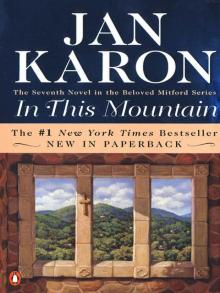 In This Mountain
In This Mountain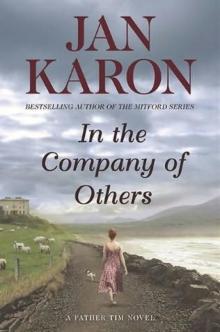 In the Company of Others
In the Company of Others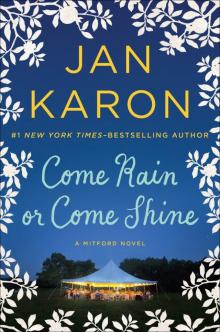 Come Rain or Come Shine
Come Rain or Come Shine To Be Where You Are
To Be Where You Are These High, Green Hills
These High, Green Hills Light From Heaven
Light From Heaven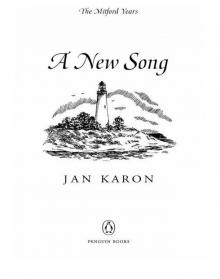 A New Song
A New Song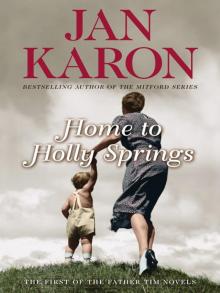 Home to Holly Springs
Home to Holly Springs The Mitford Bedside Companion
The Mitford Bedside Companion At Home in Mitford
At Home in Mitford Shepherds Abiding
Shepherds Abiding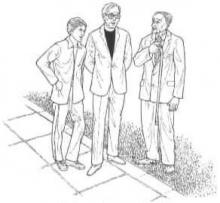 Out to Canaan
Out to Canaan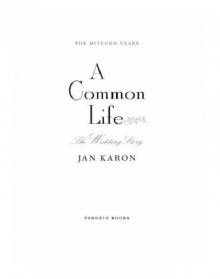 A Common Life: The Wedding Story
A Common Life: The Wedding Story Jan Karon's Mitford Years
Jan Karon's Mitford Years